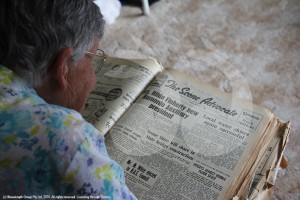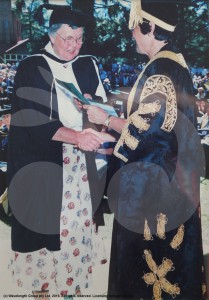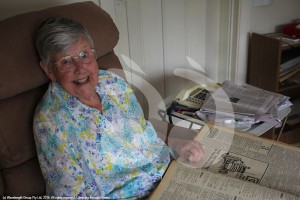Sconeite Snippet – Betty Pinkerton
BETTY Pinkerton decided to enrol in University when she was 61 to study archaeology and now in her 88th year she is still passionate about unearthing local stories from the past.
As an active member of the Scone and Upper Hunter Historical Society for almost 30 years, Betty has contributed an enormous amount to preserving our local history and is herself a treasure trove of information.
As she flips through old copies of the local newspaper she points out the detailed and personal nature of the stories.
“They used to report on when people were home from holidays, when people went back to work, when people were in hospital, their room number and anything they’d like taken to them when visitors dropped by,” said Ms Pinkerton.
“But they stopped doing that because unscrupulous people would know when some people were not home,” she said.
Betty said that all her life she has loved history and local history is something she learnt as a child at knee of her parents.
“I loved history at school, mostly Australian history and the early explorers,” said Betty.
“I’m really thankful for my father making sure the girls in the family had the same education opportunities as the boys and that was not common back then.
“Local history I learnt from my father, it was always spoken about so I knew of it,” she said.
Betty is a fourth generation Sconeite and her great-uncle Matthew Miller was responsible for building some of the earliest buildings in town, so there was much history her family could impart.
After a career as a governess, carer for some elderly ladies and working at the nursing home, Betty decided to go back to education and applied for University.
“I wasn’t the oldest; there was actually a lady of 83 who took her notes in shorthand,” said Betty.
“I studied mostly Australian archaeology, most people think you have to go to Egypt, but there is a lot of archaeology to be done here.
“My first dig was at Lake Innes near Port Macquarie.
“But when I say dig I still hear the words of my lecturer in my ears saying we don’t dig we excavate”, she laughed.
“Lake Innes House was built in 1831 and we actually found they had flushing toilets in the house.
“There were Royal Dalton toilet bowls with the willow pattern on them, that is now all at the Port Macquarie museum,” Betty said.
On the home front Betty was involved with researching the history of the petrified tree on Moobi Road.
“I wrote a piece on the petrified stump on the back road to Muswellbrook,” said Betty.
“They had to put a cage around it, because people kept chipping off pieces to take as souvenirs,” she said.
Betty accredits the war to advancing women and muses it was perhaps the reason she never married.
“My mother was a teacher, but she had to leave work when she was married in those days,” said Betty.
“One thing the war did teach people is that women can do things.
“Even the Queen had a job, getting vehicles going again.
“It hurried up a lot of things, including medical advances.
“But there was a shortage of men after the war, so maybe the person I was supposed to marry might have died.
“I was never really interested in marriage though,” Betty Pinkerton said.
Betty’s interest in local history has never waned.
She still enjoys helping people who visit the Research Centre to unearth their family history or tell their stories about when they lived in the building as a policeman or their family.
Just as Betty learnt the local oral history from her father, which was handed down through generations of their family, she is passing on that oral history to the rest of our community.
Related story:
- Vale Betty Pinkerton – February 4, 2020.
 scone.com.au
scone.com.au

